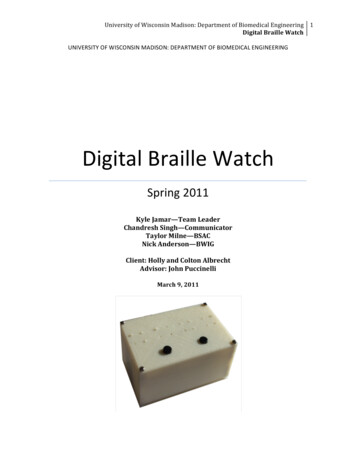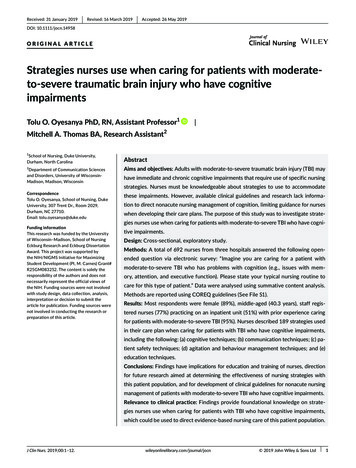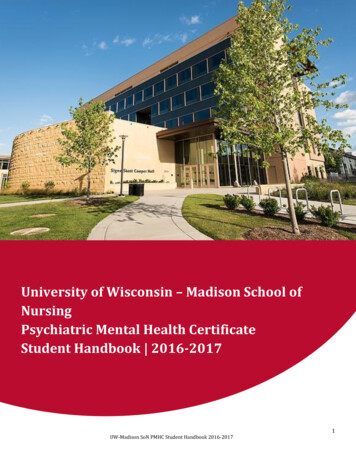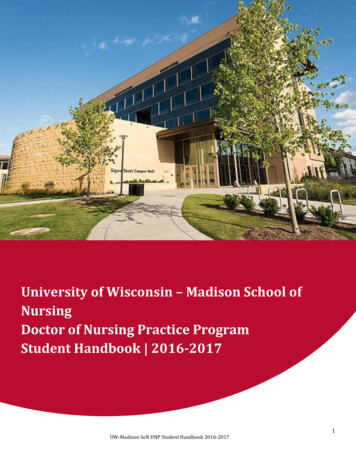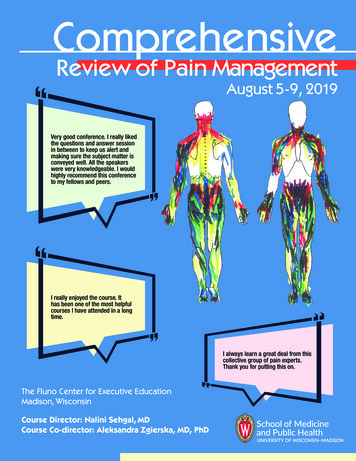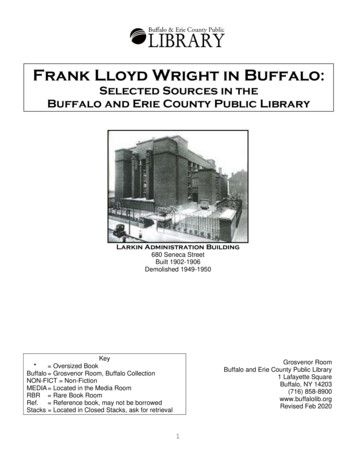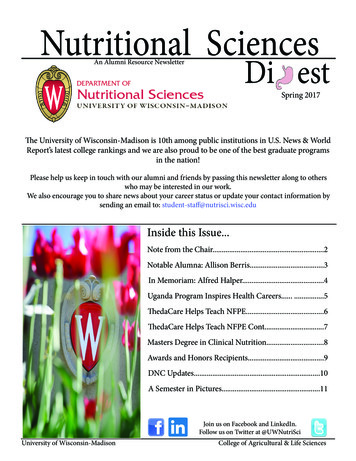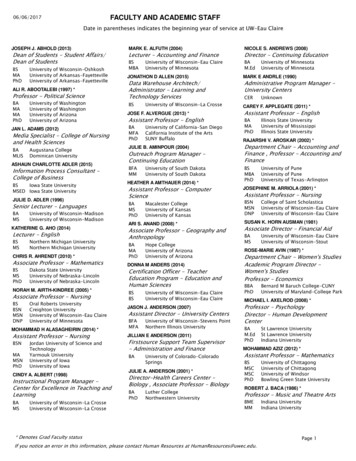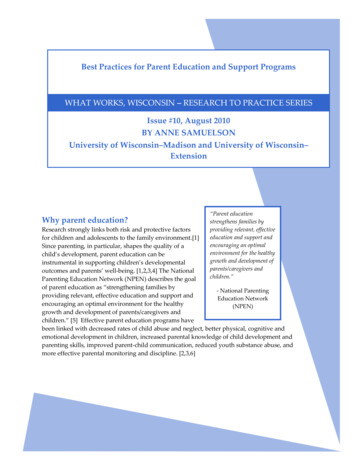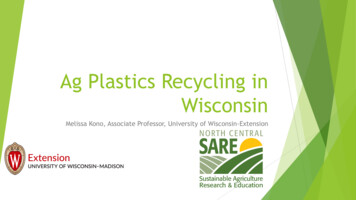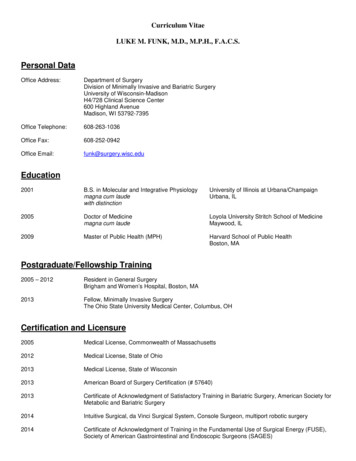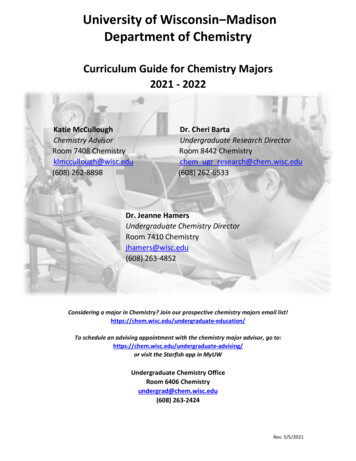
Transcription
University of Wisconsin‒MadisonDepartment of ChemistryCurriculum Guide for Chemistry Majors2021 - 2022Katie McCulloughChemistry AdvisorRoom 7408 Chemistryklmccullough@wisc.edu(608) 262-8898Dr. Cheri BartaUndergraduate Research DirectorRoom 8442 Chemistrychem ugr research@chem.wisc.edu(608) 262-6533Dr. Jeanne HamersUndergraduate Chemistry DirectorRoom 7410 Chemistryjhamers@wisc.edu(608) 263-4852Considering a major in Chemistry? Join our prospective chemistry majors email /To schedule an advising appointment with the chemistry major advisor, go to:https://chem.wisc.edu/undergraduate-advising/or visit the Starfish app in MyUWUndergraduate Chemistry OfficeRoom 6406 Chemistryundergrad@chem.wisc.edu(608) 263-2424Rev. 5/5/2021
REQUIRED CHEMISTRY COURSES FOR THE CHEMISTRY MAJORA. General ChemistryChoose one from:(37 credits)CHEM 109 Advanced General Chemistry (5 cr; fall only)CHEM 109H Advanced General Chemistry Honors (5 cr; fall only)CHEM 115 Chemical Principles I (5 cr; fall only; enrollment by invitation)CHEM 104 (5 cr) (CHEM 103 is a prerequisite.)CHEM 109, 109H, or 115 is recommended, but CHEM 103/104 also fulfils this requirement.B. Analytical Chemistry1CHEM 329 Fundamentals of Analytical Science (4 cr; fall or spring)OR CHEM 116 Chemical Principles II (5 cr; spring only; only open to students who took CHEM 115)C. Inorganic ChemistryCHEM 311 Chemistry Across the Periodic Table (4 cr; fall or spring)D. Organic Chemistry (All courses offered fall, spring, and summer.)CHEM 343 Introductory Organic Chemistry (3 cr)CHEM 344 Introductory Organic Chemistry Laboratory (2 cr)CHEM 345 Intermediate Organic Chemistry (3 cr)E. Physical Chemistry (All courses offered fall and spring; labs also offered summer.)CHEM 561 Physical Chemistry I (3 cr) or CHEM 565 Biophysical Chemistry (4 cr)2CHEM 562 Physical Chemistry II (3 cr)CHEM 563 Physical Chemistry Laboratory I (1 cr)CHEM 564 Physical Chemistry Laboratory II (1 cr)F. Advanced Non-Laboratory Coursework (5 cr) Choose from any 500-600 level courses in chemistry that are not researchcourses. Options include:BIOCHEM 501 Introduction to Biochemistry (3 cr) orCHEM 421/MS&E 421 Polymeric Materials (3 cr; spring only)BIOCHEM 507 General Biochem I (3 cr; fall only)CHEM 505/CBE 505 Industrial Chemistry (3 cr)BIOCHEM 508 General Biochemistry II (3 cr; spring only)CHEM 511 Inorganic Chemistry (3 cr; spring only)BIOCHEM/NUTR SCI 510 Nutritional Biochemistry &CHEM 524 Chemical Instrumentation (3 cr; only 2 crMetabolism (3 cr.; spring only)count for advanced non-lab work; spring only)BIOCHEM 625 Mechanisms of Action of Vitamins &CHEM 547 Advanced Organic Chemistry (3 cr; fall only)Minerals (2 cr.; spring only)CHEM 629 Atmospheric Chemical Mechanisms (3 cr;The extra one credit associated with CHEM 116 and CHEM 565every other fall)also count towards the 5 credits.CBE 440 Chemical Engineering Materials (3 cr)BIOCHEM 501 and BIOCHEM 507 cannot both count towardsCBE 540 Polymer Science & Technology (3 cr)the 5 credits.CBE 547 Introduction to Collide & Interface Science (3 cr)G. Additional Laboratory Work (3 cr) Choose from the following lab courses:BIOCHEM 691/692 Senior ThesisCHEM 346 Intermediate Organic LaboratoryBIOCHEM 699 Special Problems(1-2 cr; fall only)BMOLCHEM 504 Human Biochemistry Lab3CHEM 524 Chemical Instrumentation(3 cr; only 1 cr counts for lab work; spring only)(3 cr; only 2 cr count for lab work)CHEM 681/682 Senior Honors ThesisCBE 599 Special ProblemsCHEM 691/692 Senior ThesisNote that students need to first find a research advisorCHEM 699 Directed Studybefore enrolling in one of the directed study or thesisBIOCHEM 681/682 Senior Honors Thesiscourses.1Students are strongly encouraged to take either CHEM 329 or CHEM 116 (if invited) to fulfill the Analytical Chemistry requirement.However, CHEM 327 may be substituted for this requirement.CBE 310 Chemical Process Thermodynamics or MS&E 330 Thermodynamics of Materials may be substituted for this requirement. Theseoptions are only recommended for students who are also majoring CBE or MS&E.2BMOLCHEM 504 is not recommended for students who are also majoring in Biochemistry, because it overlaps significantly with requiredbiochemistry course work.3Rev. 5/5/20212
MATH AND PHYSICS REQUIREMENTSCalculus and calculus-based physics classes are also required for the chemistry major.MathematicsMATH 221 Calculus and Analytic Geometry 1 (5 cr)MATH 222 Calculus and Analytic Geometry 2 (4 cr)MATH 234 Calculus-Functions of Several Variables (4 cr) and MATH 320 Linear Algebra and DifferentialEquations (3 cr) are also highly recommended, although they are not required. Students with MATH 221 and 222credit from AP Calculus are especially encouraged to take further math.PhysicsPHYS 207 General Physics or PHYS 201 General Physics or PHYS 247 A Modern Introduction to PhysicsPHYS 208 General Physics or PHYS 202 General Physics or PHYS 248 A Modern Introduction to PhysicsPHYS 207/208 is the preferred sequence for chemistry majors, while PHYS 201/202 is recommended forengineering students. PHYS 247/248 is an honors sequence that may be taken by chemistry majors as well.COURSE SELECTION AND SEQUENCINGIntroductory Chemistry CoursesStudents intending to major in chemistry should take general chemistry in their first year. There are threedifferent options for introductory chemistry, and the best choice depends on the student's background.Students with one year of high school chemistry often take the CHEM 103 General Chemistry I/CHEM 104General Chemistry II sequence. Students with a strong high school chemistry background (usually two years) andplacement into at least first semester calculus are eligible for CHEM 109 Advanced General Chemistry, anadvanced, fast-paced option that covers the breadth of general chemistry in one semester. CHEM 109 is offeredonly in the fall semesters and an honors level section is available. Students with exceptionally strong math andscience backgrounds may be invited to apply for the CHEM 115 Chemical Principles I/CHEM 116Chemical Principles II sequence. This honors sequence is more math and physics based than the other options,features a small class size, and provides an opportunity for research during the second semester. The 115/116sequence satisfies both the general and analytical chemistry requirements for the major.Mathematics and PhysicsMost chemistry majors complete calculus during their first year. Physics is most often taken in the second year.Students interested in chemistry with a biological emphasis will usually take biology in their second year andthen take physics and biochemistry in their third year.Intermediate Level Chemistry CoursesChemistry majors take intermediate level courses in three different areas of chemistry: analytical (CHEM 329),inorganic (CHEM 311), and organic (CHEM 343, CHEM 345, and CHEM 344). These areas are independent fromone another and do not need to be taken in a particular order. Below are some points for students to considerwhen making their selections. It is recommended that students complete the required 300-level courses by the end of their third year. Opportunities for taking advanced electives or for doing research in one area may be enhancedsomewhat by an earlier start in that area.Rev. 5/5/20213
Students are strongly encouraged to take the laboratory courses CHEM 311, CHEM 329, and CHEM 344in three different semesters. In particular, CHEM 329 and CHEM 344 are especially challenging to take inthe same semester, because they both include eight hours of laboratory time per week.CHEM 344 Introductory Organic Chemistry Laboratory may be taken concurrently with or afterCHEM 345 Intermediate Organic Chemistry. Some students prefer to take the two concurrently becausethe content of these courses complement each other well. Others prefer to take 344 after 345 so thatthey have more time to process and assimilate the material.An honors sequence for students especially interested in the chemical sciences is offered in organicchemistry, CHEM 343 (fall only) and CHEM 345 (spring only). Enrollment is by invitation and based ongrades in prior chemistry coursework.Students desiring a more compressed schedule may opt to take either CHEM 311 or CHEM 329 (whichinclude labs) concurrently with the non-laboratory courses CHEM 343 or CHEM 345 (if not also takingthe organic lab).Physical ChemistryIt is recommended that students begin physical chemistry by the second semester of their third year. Calculus,physics, and analytical chemistry are all prerequisites. Most chemistry majors take CHEM 561 Physical Chemistryfor their first physical chemistry course. Students who are also interested in biochemistry usually take CHEM 565Biophysical Chemistry instead. Chemistry majors who are also majoring in Chemical & Biological Engineeringtake CBE 310 Chemical Process Thermodynamics. It is recommended that CHEM 563 Physical ChemistryLaboratory be taken after CHEM 561 (usually concurrently with CHEM 562 Physical Chemistry), and thatCHEM 564 Physical Chemistry Laboratory be taken after completion of CHEM 562. Especially strong studentsneeding to complete physical chemistry in two semesters may take CHEM 563 concurrently with CHEM 561 (or565) and CHEM 564 concurrently with CHEM 562.Additional Laboratory Work Requirement and Research InvolvementThe additional laboratory work requirement for the major can be satisfied through either research and/oradditional course work. Either way, it is exceptionally difficult to complete this requirement in one semester,and students need to plan ahead. It is strongly encouraged that students who are interested in research beginlooking for a research group by the end of their sophomore year and no later than the first semester of theirjunior year. Although it is possible to find a research group after this point, it is much more difficult. Should younot find a research group, this timeframe would also allow you time to plan accordingly for the required coursesyou would need in place of research. The non-research course options are CHEM 346, CHEM 524, andBMOLCHEM 504, and students without research credits will need two of these courses. At any point should youhave questions regarding finding research or the courses you would need to take, please reach out to theChemistry Advisor, Katie McCullough: klmccullough@wisc.edu or the Undergraduate Research Office:chem ugr research@chem.wisc.edu .FOUR-YEAR PLANS FOR THE CHEMISTRY MAJORThe next pages show a few possible course sequences for the chemistry courses required for the major. Thesepathways are all based on a four-year undergraduate degree. Those students who plan to take longer and/ortake courses in the summer can decompress these schedules. Variations to these plans are possible, as long asthe student pays attention to required requisites. In presenting these pathways we hope that students will haveenough information to tailor course sequences to best achieve their educational objectives.Rev. 5/5/20214
Pathway 1 – Starting with CHEM 109Pathway 1 has students completing general chemistry (CHEM 109) their first semester and beginningthe intermediate level courses the second semester of their first year. In an alternative version of thisplan, students could start the organic sequence (CHEM 343) the second semester of their first year andpostpone analytical (CHEM 329) to the second semester of their second year.Fall SemesterCrYear 3CHEM 311CHEM 561Research (optional)431-3Year 4CHEM 564CHEM Elective (non-lab)Research or Additionallab credits131-3Year 1Year 2CHEM 109MATH 221CHEM 343PHYSICS 207Research (optional)55351-3Spring SemesterCHEM 329MATH 222CHEM 345CHEM 344 (or summer)PHYSICS 208Research (optional)CHEM 562CHEM 563Research or Additionallab creditsCHEM Elective (non-lab)Research (optional)Cr443251-3311-331-3Pathway 2 – Starting with CHEM 103/104Pathway 2 includes completing general chemistry (CHEM 103 and 104) and the required math coursesthe first year and beginning the intermediate courses the second year. A variation of this plan could beto take CHEM 329 in the fall of the second year and start organic chemistry in the spring of the secondyear.Fall SemesterCrYear 3CHEM 329CHEM Elective (non-lab)Research (optional)431-3Year 4CHEM 562CHEM 563Research or Additionallab credits311-3Year 1Year 2Rev. 5/5/2021CHEM 103MATH 221CHEM 343PHYSICS 207Research (optional)45351-3Spring SemesterCHEM 104MATH 222CHEM 345CHEM 344 (or summer)PHYSICS 208Research (optional)CHEM 311CHEM 561Research or Additionallab creditsCHEM 564CHEM Elective (non-lab)Cr543251-3431-3135
Pathway 3 – Students Pursuing Careers in Chemistry with Biological EmphasisPathway 3 provides options for students interested in fields with a biological emphasis, such aschemical biology, biochemistry, or pharmacy. Some students might find the second-year of the planbelow to be especially challenging. One variation would be to postpone CHEM 329 until the fall of thethird year and move CHEM 311 to spring of the third year. Additionally, one or two of the organiccourses could be taken during a summer term.Year 1Year 2Year 3Year 4Fall SemesterCrCHEM 565CHEM 563Research or Additionallab credits411-3CHEM 103MATH 221CHEM 329CHEM 343BIO 151CHEM 311BIOCHEM 507PHYSICS 20745435435Spring SemesterCHEM 104MATH 222CHEM 345CHEM 344 (or summer)BIO 152PHYSICS 208BIOCHEM 508Research or Additionallab creditsCHEM 562CHEM 564Research (optional)Cr54325531-3311-3Pathway 4 – Students Planning to Study AbroadIt is definitely possible for chemistry majors to study abroad and still graduate in four years! Pathway 4provides one possible route. It is sometime difficult to satisfy specific chemistry major requirementswhile abroad, because chemistry curriculum and sequencing at foreign institutions can differsignificantly from ours. Chemistry majors who study abroad often focus on satisfying breadth andforeign language requirements while abroad. Advance planning is essential. Summer study abroadprograms are also an option. Students interested in studying abroad should consult early with theInternational Programs Office (https://www.studyabroad.wisc.edu/) and the chemistry advisor.Year 1Year 2Year 3Year 4Rev. 5/5/2021Fall SemesterCrCHEM 345 (or summer)CHEM 344Research (optional)CHEM 561CHEM 563 (or spring)CHEM Elective (non-lab)Research or Additionallab credits321-33131-3CHEM 103MATH 221CHEM 329PHYSICS 207Research (optional)45451-3Spring SemesterCrCHEM 562CHEM 564 (or summer)CHEM Elective (non-lab)Research or Additionallab credits3131-3CHEM 104MATH 222CHEM 311CHEM 343PHYSICS 208Research (optional)Study Abroad544351-36
COLLEGE OF LETTERS & SCIENCEB.A. and B.S. Degree Requirements, at a glanceRequirements efective for students matriculating to any postsecondary institution May 21, 2007 and laterTOOLS for Learning and CommunicationUniversity General Education RequirementsOne Communication A course (a)One Quantitative Reasoning A course (q)One Quantitative Reasoning B course (r)One Communication B course (b)One 3 credit Ethnic Studies course (e)MathematicsBachelor of ArtsMet with GER Quantitative A & B (above)Bachelor of ScienceTwo 3 credit courses at I/A level (MATH, COMP SCI, STAT)(Limit one each: COMP SCI, STAT)Minimum Math Competency demonstrated by placement score or course is required for all studentsForeign LanguageBachelor of ArtsFourth level of a language, orThird level of a language and Second level of another languageBachelor of ScienceThird level of a languageBREADTH of Exploration in the Liberal Arts & SciencesHumanities: 12 credits (L,H,X,Z)6 credits Literature (L)Social Science: 12 credits (S,W,Y,Z)Natural Science: 12 credits (B,P,N,W,X,Y)Bachelor of ArtsOne 3 credit Biological science course (B)One 3 credit Physical Science course (P)Bachelor of Science6 credits Physical Science (P)6 credits Biological Science (B)108 Liberal Arts & Sciences credits (C)DEPTH of inquiry in the Liberal Arts & SciencesMastery of Intermediate/ Advanced Work: 60 credits (I,A,D)Major: Declare at least one major (and complete all declared majors)QUANTITY & QUALITY of WorkThere are limits on credits for certain courses. Consultthis Catalog and your DARS for more information120 Total CreditsUW-Madison Experience30 credits in residence overall30 credits in residence after the 90th credit15 upper-level credits in residence in each major15 credits on campus in each major/DepartmentMinimum GPAs2.0 in all courses at UW-Madison2.0 in I/A/D Level work at UW-Madison2.0 in all major &major department courses2.0 in upper-level major &major coursesIn all categories, requirements listed are minimums. Further study, especially in Breadth and Depth, is encouraged.
CHEMISTRY UNDERGRADUATE RESEARCHThe Department of Chemistry highly encourages all students pursuing a chemistry degree to get involved inundergraduate research during their academic career. Not only do students have the opportunity to experiencecutting-edge research, but undergraduate researchers also have the opportunity to apply what they have learnedin class to ‘real-life’ situations, to work alongside world-class researchers, and to develop invaluable marketableskills that are hugely advantageous when applying to graduate programs, professional schools, and/or jobs inSTEM fields.Types of Research Opportunities:Conducting research for course credit is the most common option, but opportunities to conduct research for payor as a volunteer during any semester, including summer, are also available. Regardless, you must first find aresearch advisor who will sponsor you to work in their lab for the semester and several blocks of time (at least 45 hours) are typically required each week to carry our your project. See the table below for course options withinthe chemistry department.CourseCourse DescriptionsCreditsEligibility/PrerequisitesChem 299Independent mentoredresearch1-4Open to freshmen/sophomoresChem 699*Advanced independentmentored research1-6Chem 681/682*Advanced independentmentored research, requiredfor a senior honors thesis2-4 per semester,must total 6 creditsbetween 681 and 682Chem 691/692*Advanced independentmentored researchrecommended for seniorsmajoring in chemistrySeminar course designed tohelp students beginindependent research.2-6 per semester,must total at least 4credits between 691and 6921 credit seminarcourse, offered Falland SpringOpen to students who havecompleted 1 semester ofresearch OR have junior/seniorstandingOpen to senior honorscandidates; must take bothsemesters and complete aresearch thesisOpen to seniors; must take bothsemesters and complete aresearch thesisChem 260Recommended to be takenconcurrently with 1-3 researchcredits.Note: 1 credit of research corresponds to 3-4 hours of lab work per week for 15 weeks.* counts towards the 3 credits of additional lab work required for the completion of the chemistry majorSteps to Get Involved:Find researchthat interestsyouEmailpotentialfacultyAgree on astudy/researchplanComplete aResearchAuthorizationFormWant help taking the next step? Visit the Undergraduate Research Website atundergradresearch.chem.wisc.edu or contact Dr. Cheri Barta at chem ugr research@chem.wisc.eduRev. 5/5/20218
CHEMISTRY HONORS IN THE MAJORStudents may declare Honors in the Chemistry Major in consultation with the chemistry major ng/). To be admitted to the Honors Program in Chemistry,students must have declared a major in chemistry and achieved a 3.200 overall GPA. They must also haveachieved a 3.200 GPA in all CHEM courses taken and courses accepted for the major.Candidates for honors in the major should select a faculty research mentor by the fall semester of their junioryear. Mentors may come either from chemistry or from a related department such as chemical engineering,pharmacology, or biochemistry. Students who choose a mentor from outside the chemistry department areresponsible for providing the mentor with the requirements for the honors major in chemistry.To earn Honors in the Major in Chemistry, students must satisfy both the requirements for the regular majorand the following additional requirements: Earn a 3.300 overall university GPA.Earn a 3.300 GPA for all CHEM courses and all courses accepted for the major.Complete an additional 3 credits, for a total 8 credits, of advanced non-laboratory work. Thisrequirement is met by the same credits and courses that are accepted for “Advanced Non-laboratoryWork” in the regular major. This requirement may also be met by:o Additional research credits, beyond any credits being used to satisfy the 3 additional laboratorycredits required for the major; oro Additional breadth courses in other related disciplinesComplete the two-semester sequence CHEM 681/682 Senior Honors Thesis for a total of 6 credits.Present their work to their peers in a symposiumAdditional breadth courses for advanced work may come (for example) from engineering, physics, molecularbiology, computer science, water chemistry, and business. Advanced level courses should be chosen inconsultation with the student’s research mentor. Courses required for the chemistry major cannot be used tosimultaneously satisfy the advanced course requirement for honors in the major.Several opportunities for students to present their work at a symposium are available near the end of the springsemester every year. These opportunities include the Chemistry Undergraduate Poster Session held every May,the campus-wide Undergraduate Symposium in April, and the L&S Senior Honors Thesis Symposium also in April.CHEMISTRY DEPARTMENT SCHOLARSHIPS AND AWARDSThrough the generosity of alumni and other friends of the department, the Department of Chemistry is able tooffer academic year scholarships and summer research support. In 2020, the Department awarded more than 40scholarships totaling over 140,000. Any student who is a chemistry major or is conducting research with achemistry faculty member is eligible to apply for the scholarships. An overall GPA of at least 3.0 is required, andawards are based on both merit and financial need. Students may apply for academic year scholarships and/orsummer research support. The academic year scholarships range from 1,500 to 7,200, while summer researchawards ranged from 4,000 - 5,500 each. More information about chemistry scholarships can be found awards/.To learn about other scholarships offered at UW-Madison, visit https://wisc.academicworks.com/ and the Officeof Student Financial Aid (http://finaid.wisc.edu/).Rev. 5/5/20219
CAREER AND INTERNSHIP RESOURCESAs a student, it is important to work on your personal and professional development while here at UW-Madison.This will help prepare you for your next steps after graduation, and it is never too early to get started! Listedbelow are a couple of campus resources available to you. In addition, we will notify you via email and on ourresource bulletin boards (outside the Undergraduate Office, Room 1328) of additional opportunities. You canalso visit our Career Opportunities page at: https://chem.wisc.edu/career-services/CAREER EXPLORATION CENTER (CEC)The CEC is the leading campus resource for UW-Madison undergraduates who need help exploring majors andcareers. They help students focus on their interests, values, strengths, and personality to give them the toolsthey need to make decisions about their careers and their futures.Location and Contact Information114 Ingraham Hall Email: cec@ccas.wisc.edu Phone: 608.265.4497 Website: https://cec.ccas.wisc.edu/SUCCESSWORKS AT THE COLLEGE OF LETTERS & SCIENCESuccessWorks is a personal and professional development center just for L&S students, helping you connectwith the advisors, alumni, and employers who can help you land the jobs and internships you’re looking for!Whether you’re a first-year student or a senior, you can receive help on resume writing, interview skills,internships, networking, and anything else you need to help you prepare for graduation. They also work withstudents on their graduate school application timelines.Location and Contact Information711 State Street, Suite 300 (3rd floor of the bookstore) Email: SuccessWorks@ls.wisc.eduPhone: 608.262.3921 Website: https://successworks.wisc.edu/INTER-LS 210 – L&S CAREER DEVELOPMENT: TAKING INITIATIVEThe goal of this one-credit course is to give you the tools you need to be able to seek out knowledge and skills asyou make future career and life decisions. Over the semester, you will produce an ePortfolio in which you willtrack your personal growth and progress, demonstrate your ability to apply these theories, and produce jobtools that you can build upon in the future, such as an internship/job application, skills assessment, andinterview of a professional.INTER-LS 215 – COMMUNICATING ABOUT CAREERSThis three-credit course explores the meaning and value of a liberal arts and sciences education for careers inthe global, technological, and multicultural workplace of the 21st century. Through a series of individual andcollaborative research and communication assignments, learn to critically analyze the career and educationimplications of a diverse and digital workplace, and to critically reflect on strengths and values to prepare toconnect college work with lifelong career success. This course also fulfills the COMM B requirement.HANDSHAKEHandshake (https://careers.wisc.edu/handshake/) is UW-Madison’s primary recruitment and career eventmanagement tool. Students can use Handshake to explore career events, apply for jobs and internships, connectwith potential employers, and mange campus interviews.Rev. 5/5/202110
DECEMBER 2016TRENDSCHEMISTRY MAJORCHECKLISTIMPRINTMAGAZINE.COMWe encourage you to complete this checklist before yougraduate! Your time as a student will go quickly, so we want tomake sure that you are taking advantage of all the greatopportunities UW-Madison has to offer!Please note that what is listed below are suggestions, notrequirements for the chemistry major.GET YOUR PICTURE TAKENStop by the Undergraduate ChemistryOffice (RM 1328) to have your picturetaken for the Chemistry Major Poster,displayed just outside the office!ATTEND CHEMISTRY EVENTSAttend a career panel, intro toresearch event, employer visit, studysession, or seminar!Visit: chem.wisc.edu/calendarGET INVOLVED WITH RESEARCHFind a research group - the sooner thebetter! Research also fulfillschemistry major requirements. Learnhow to get involved at:undergradresearch.chem.wisc.eduJOIN A STUDENT ORGWhether it be one of our chemistrystudent organizations (AXE, ACS, orSPICE) or one of the hundreds of otherson campus, we encourage you to bepart of something you're excited about!Visit: win.wisc.eduAPPLY FORSCHOLARSHIPSThe Chemistry Department awardedmore than 40 undergraduatescholarships and awards in 2019 thattotaled almost 135,000!Visit: wisc.academicworks.comJOIN AND EXPLORE JOBSEARCHING TOOLSCreate a LinkedIn profile, becomefamiliar with Indeed.com and joinHandshake!DEVELOP A RESUME ANDCOVER LETTERKeep track of volunteering, research, jobs,internships, and other experiences that can beadded to your resume and cover letter.Whether you go into industry or graduateschool after graduation, a strong resume isessential! Visit SuccessWorks, the WritingCenter, or workshop events for assistance!UTILIZE CAMPUS CAREERRESOURCESAttend the Career & Internship Fair in thefall and spring, enroll in Inter-LS 210 or215, visit SuccessWorks and the CareerExploration Center! IN WITH THECHEMISTRY ADVISORStop by drop-in, send an email, call, ormake appointment! It's a good idea tocheck-in to make sure you are stayingon track or just to say hello!NETWORKVisit office hours, meet withinstructors, attend events, make newfriends, and put yourself out there!Get to know your campus andchemistry community!HAVE FUN!Eat ice cream at the terrace, go to aBadger football game, try a newrestaurant on State Street. Enjoy yourtime as a student in this great city!
CHEM 344 Introductory Organic Chemistry Laboratory may be taken concurrently with or after CHEM 345 Intermediate Organic Chemistry. Some students prefer to take the two concurrently because the content of these courses complement each other well. Others prefer to take 344 after 345 so that they have more time to process and assimilate the material.
